Marco Polo may be one of the world's most famous men. He left his hometown at a young age to travel to Asia with his father and uncle. A book about his travels was published and became an overnight bestseller, although many did not believe him. It is a miracle that we are not yet to understand about this mysterious man and what he saw through life. For years, the masses claimed he was a liar. However, he swore on his deathbed that he had only spoken a fraction of the truth.
Marco Polo's Early Life
-
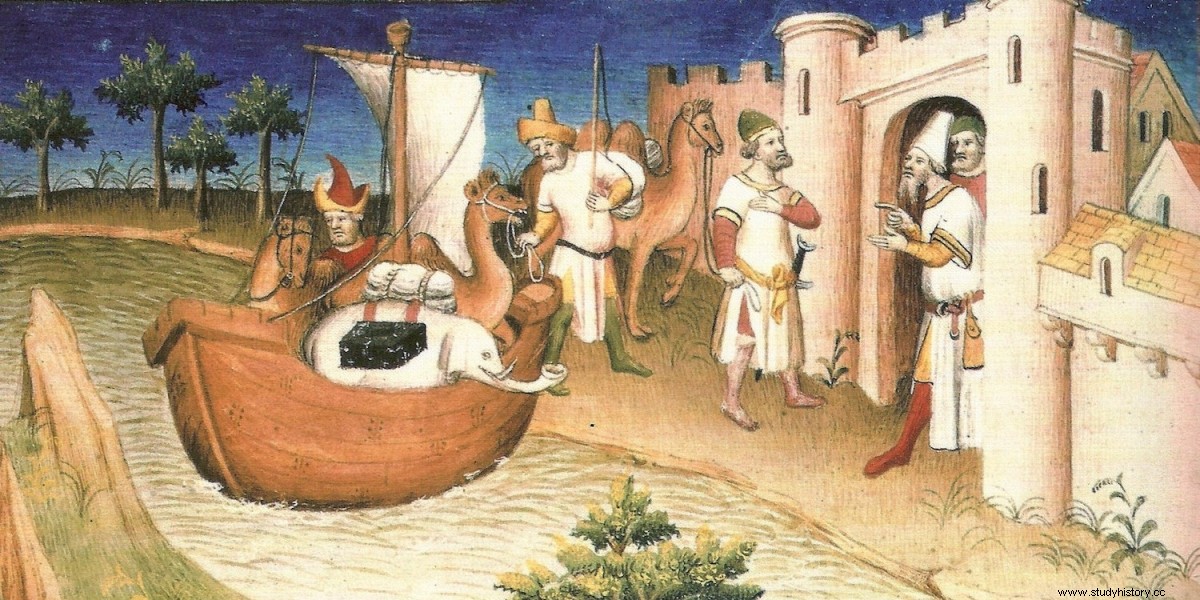
- credit:coindesk
Born in Venice, Italy, in 1254, Marco Polo was part of a wealthy trading family. His mother died at a young age, and he was raised by the extended family for much of his early life. Niccolo, his father, and Maffeo, his uncle, were on the road in their early childhood. At the age of 15, his father and uncle returned from Asia after spending years traveling and selling goods. When they returned home, the brothers began planning to return to Asia. On their travels, they had spent time with Kublai Khan, ruler of the Mongol Empire. Khan had wanted them to return as soon as they could and take 100 priests with them. For the next two years, Marco, his father, and his uncle planned to return to Asia.
Niccolo and Maffeo had been armed with a golden passport from Kublai Khan. The golden passport ensured the family's safety on their travels within the Mongol Empire. This 'passport' stated that horses, lodging and escorts must be provided if and when necessary. Failure to do so will result in shame, if not more. This item will probably prove useful for their return. The family planned to use the vessel to sail back to Asia. However, this was made impossible by the ship's condition of decay. Stories of the brothers' travels spread through Venice as they prepared to leave. Many Venetian inhabitants found it difficult to believe that there were sophisticated cultures outside the Holy Roman Empire. Not only that, but the Mongol Empire was the largest empire the world has ever seen. Few were ready to believe that it was people who had gone further than they had.
The Polo family returns to China
-
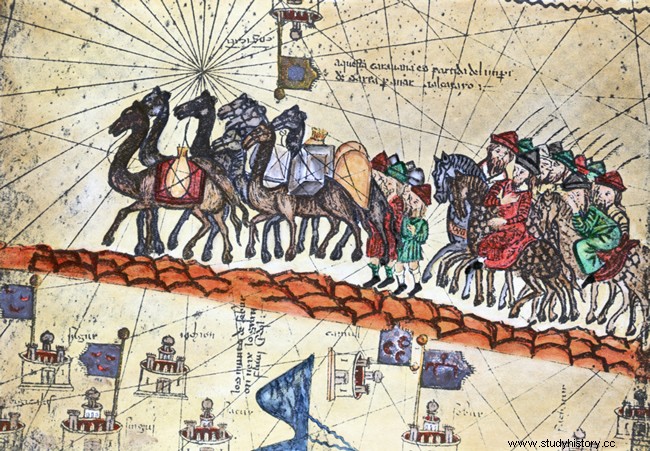
- credit:khanakademi
Finally, in 1271, the Polo family left Venice once again. In Acre, they received proper identification and who monks were assigned to accompany them on the journey. However, the suitors returned to Venice days after leaving when they reached a war zone. The Polo family continued to present-day Yumurtalik in southeastern Turkey and passed through Tabrīz, Iran. In 1272 they reached the Persian Gulf and decided to risk sea passage to India. They passed through deserts and eastern Iran before turning northeast and reaching Afghanistan. The three remained in Afghanistan for a year, although the reason for this has been the subject of debate.
When they left the A.FghanistanPolo family, the Central Asian highlands and Pamirs in our time crossed Tajikistan. The family had mostly traveled with Muslim people so far in their journey through West Asia. On their travels, however, they had also met Buddhists, Zoroastrians, Manicurists, and Nestorian Christians. They reached Kashi (now the Uygur Autonomous Region of Xinjiang) after crossing the mountains. From there, they followed the main Silk Road and most likely traveled along the oases. They encountered another civilization in Gansu Province, where the people were Buddhist, but primarily of Chinese culture. These oases led to Shazhou on the Chinese border, to a place now known as Dunhuang.
The way to reach the Mongolian summer capital has been discussed. There was uncertainty as to whether the Polo family went directly to the capital or after a detour. Historical records say that Marco Polo arrived at the Mongol court in 1275. However, investigations conducted by Matsuo Otagi have suggested that they arrived at the Mongol court in 1274.
Marco Polo arrives in Mongolian court
-
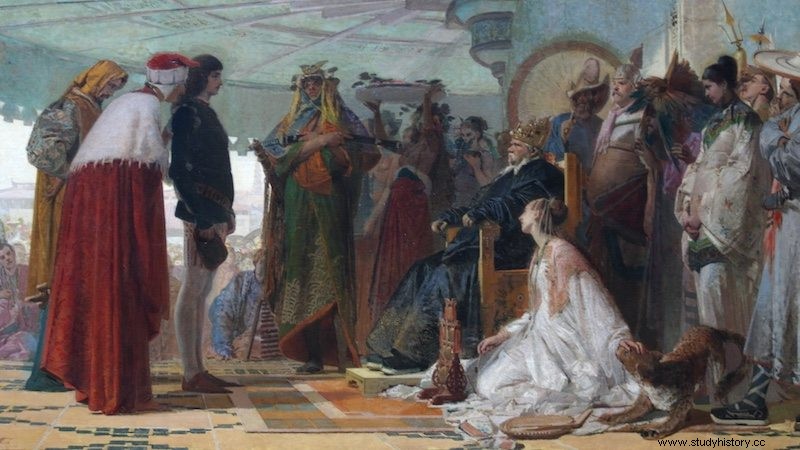
- credit:gohighbrow
Marco Polo describes in detail his arrival in Mongolian court with his father and uncle. In his books, he remembers narratives in a third-party way with exceptional details. Here he describes his first encounter with Kublai Khan as if he were an observer.
They knelt before him and howled with utmost humility. The Great Khan asked them to get up and received them honestly and entertained them in a good mood. He asked many questions about their condition and how they felt after leaving. The brothers assured him that they had done really well since they found him prosperous and prosperous. Then they presented the privileges and letters that the pope had sent, which he was very happy about, and handed over the holy oil, which he received with pleasure and greatly appreciated ... ”
“When the big cock saw Marco, who was then a young stripper, he asked who he was. 'Sir,' said Messer Niccolo, 'he is my son and your liar.' "He is most welcome," Khan said. What does it take to make a long story about it? Great was the joy and delight ... The great khan and all his court welcomed these envoys. And they were well served and taken care of in all their needs. They lived on the Court and had a place of honor over the other barons. ”
Marco Polo's role in Khan's Court
-
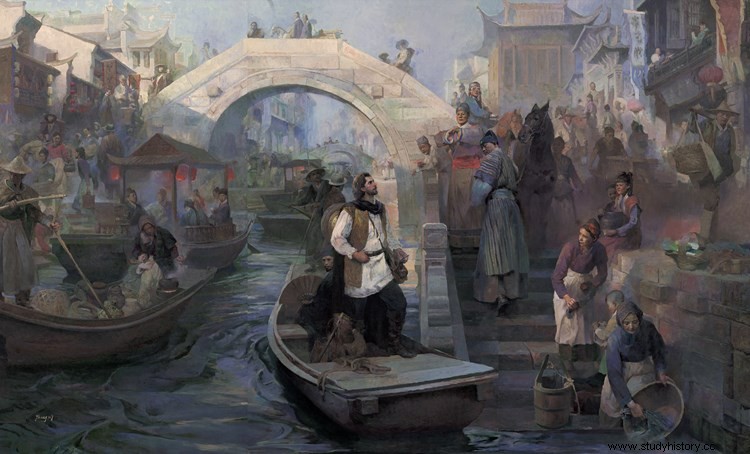
- credit:renewal
Because Marco Polo was a master of four languages, he was highly respected by Khan. He was quickly appointed to administrative positions and even served in the Khan's court. Because of Kublai Khan's trust in him, he was sent on various missions to India, China and Burma. In his books, Marco Polo described in great detail the Mongolian capital as well as the ceremonies and the hunt. The Summer Palace was described as 'the largest palace ever'. He claimed that the walls were covered with silver and gold and that the hall was large enough to accommodate 6,000 people. The structure was formed of log supported by 200 silk cords. This structure allowed the site to be separated and reconstructed when Khan moved.
Marco Polo was appointed an official of the Privy Council by Kublai Khan in 1277. For three years he served as a tax inspector in Yanzhou and visited Karakorum as well as Siberia. It was said that his father and uncle were part of the attack on Siang Yang Fou and constructed siege engines.
The details are sparse about what Marco Polo and his family did during all the years they were in Asia. He outlines different roles he was entrusted with, but gives little more in many cases.
Remarkable observations
-
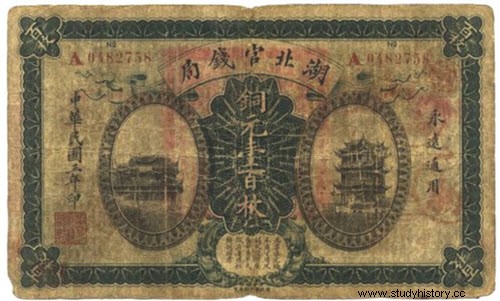
- credit:silkroad
During his travels, Marco Polo observed many new things. Some of these were new to the world while others were just new to him. His years of traveling across Asia showed him and the Western world many new things. In fact, these observations from the 13th century are now common practice in the world today.
Imperial Mail
The Imperial Mail system used in the Mongol Empire was a new and impressive system. In his authors, Marco described the communication system as having three delivery rates, much like today. Second-class messages were carried on foot, and couriers had forwardings every three miles. Bells hung on the belts of these commandments to announce their arrival. This was done to ensure enough time for their relief to prepare. By doing this, a smooth takeover was more likely, and the message could be delivered more efficiently. This method made it possible to cover what would be a 10-day journey of 24 hours. Every three miles at the posts, a log was kept and patrolled by inspectors describing the message flow.
Twenty-five miles of horse relay were used for first-class messages. In the same way, imperial messages from Khan were delivered via horsemen. These messages were carried non-stop and had the tablet with gerfalcon, the symbol of the Mongol Empire. Riders approaching their position would hear a horn announcing their arrival, and ostlers would bring a fresh horse. This effective method meant that the rider could quickly continue the journey on a new horse and continue without delay. Marco Polo stated that these riders could travel up to 300 miles in one day to deliver their imperial messages.
Paper Money
Marco Polo was met with those in the Mongol Empire using paper as a substitute for gold or silver. Both young Marco and his father and uncle were surprised to learn this. Ultimately, they regarded Kublai Khan's stature as a ruler as the reason for its success. “With these pieces of paper, they can buy anything and pay for anything. And I can tell you that the papers that are considered ten bezants do not weigh one. ”
Kull
It should be noted that coal was by no means a new discovery. This rather tells us that despite being an educated man from Italy, Marco was unaware of many common things in the world. He writes about the use of coal as follows:
"It's true that they have plenty of firewood too. But the population is so huge, and there are so many bathhouses and baths that are constantly being heated ... it would be impossible to get enough firewood, since no one is not visiting a bathhouse at least 3 times a week and take a bath - in the winter every day, if he can manage it.Each man of rank or means has his own bath in his house ... so these stones, which are very many and very cheap , gives a big saving of three. ”
The Polo family leaves the Mongol Empire
-
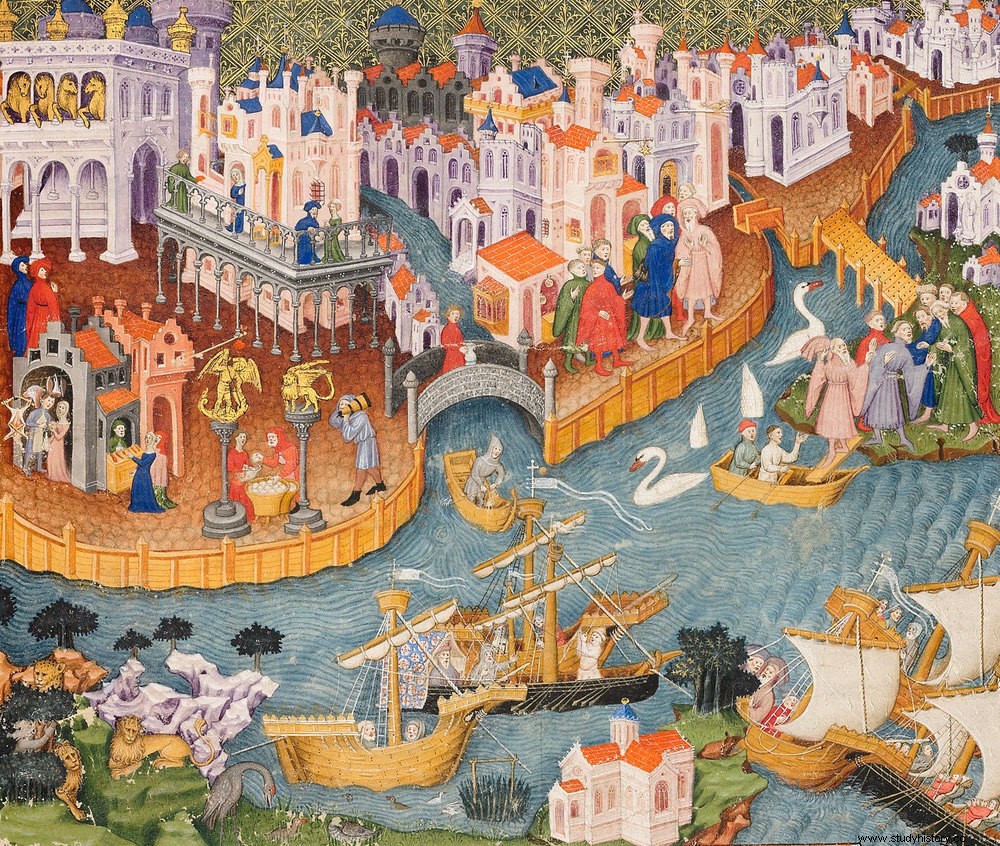
- credit:skatterbodleian
For 17 years, the Polo family lived and worked in Kublai Khan's Mongol court. In their time there, they acquired wealth in the form of gold and jewels, but became eager to travel. Khan was in his seventies, and his death would probably endanger his life. At Kublai's death, the new ruler would have the power to deprive the family of their wealth or life. With great reluctance, Kublai agreed to Polo's desire to return home. However, this could only be done if they escorted a Mongolian princess named Kokachin to Persia.
Despite the fact that the journey took two years, Marco Polo gave little description of what happened at that time. The trip resulted in the loss of 600 lives, presumably for scurvy, cholera or drowning. They passed through the South China Sea to Sumatra and to the Indian Ocean. Finally, they docked at Hormuz, where they learned of Arghun's death, the Persian prince Kokachin was to marry. In light of this, the Mongolian princess married Prince Ghazan, Arghun's son. At the same time, the group learned about the death of the great Kublai Khan. His death, however, did not stop the power of his golden blackboard Polo family bore. In fact, it was because of this tablet that the family was able to pass the interior safely. Marco Polo wrote about the power of the tablet in his books and became:
"Throughout his reign the Polos were equipped with horses and provisions and everything that was necessary ... I can assure you that on many occasions they got two hundred riders ... sometimes more and sometimes less ... according to the number needed to escort them and ensure their safe passage from one district to another. "
The Polo family returns to Venice
-
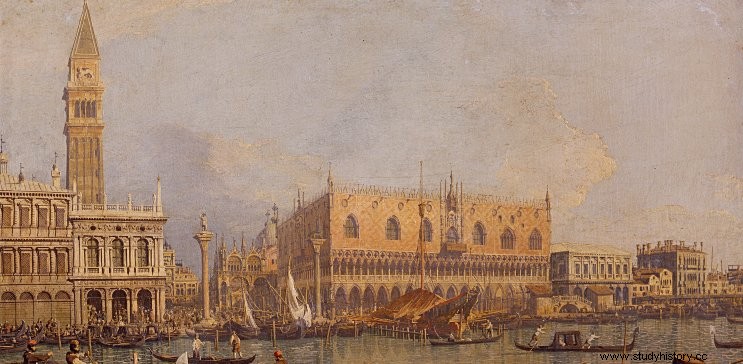
- credit:1st art gallery
Eventually, the Polo family left Persia and returned to Europe. The moment they left Mongol rule in a Christian country, they were robbed. This robbery left them only a small part of the income from working with Khan. They reached Constantinople after some delays and finally Venice in 1295.
Many in Venice had thought the Polo family was dead. When they returned home and were greeted by the crowd, the stories began to be told.
Marco Polo and his travelogue
-
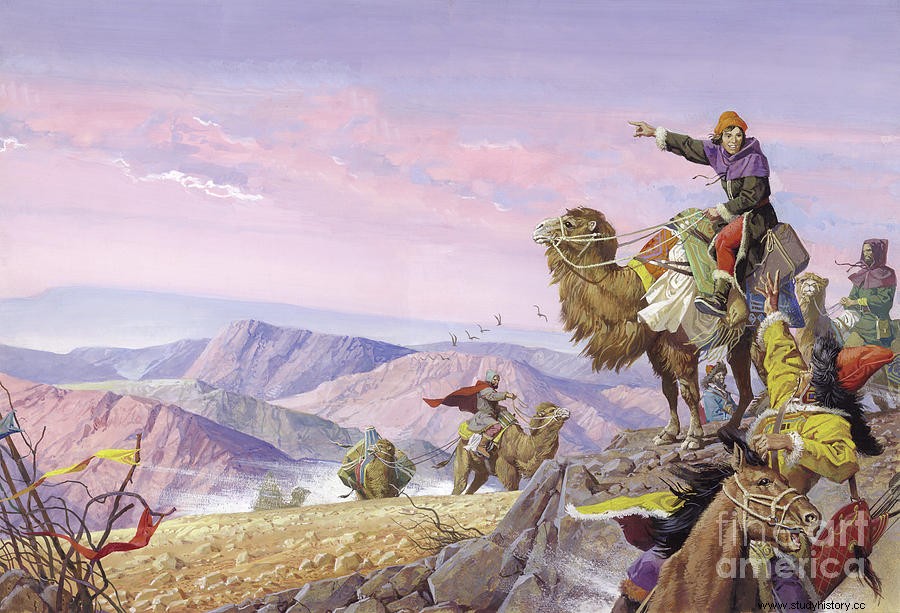
- credit:finamerica
For three years, Marco Polo commanded a galley in a war against Genoa, Venice's rival city. During the fighting, he was captured and thrown into prison. There he met Rustichello from Pisa, a famous novelist. The author eventually got Marco to tell the story of his travels, and the couple created a book. This book was then known as The Description of the World or Travels by Marco Polo. His book immediately became a bestseller when it talked about the strength of the Mongol Empire and many other things. The book ended up being one of the most popular books in medieval Europe and had a great impact.
Although the details mentioned in his books can now be confirmed, this was not the case during his lifetime. His book became known as Il Milione, or The Million Lies, and he was nicknamed Marco Milione. The incredible and strange details mentioned in his book were for many all lies.
Marco Polo's life in Venice
-
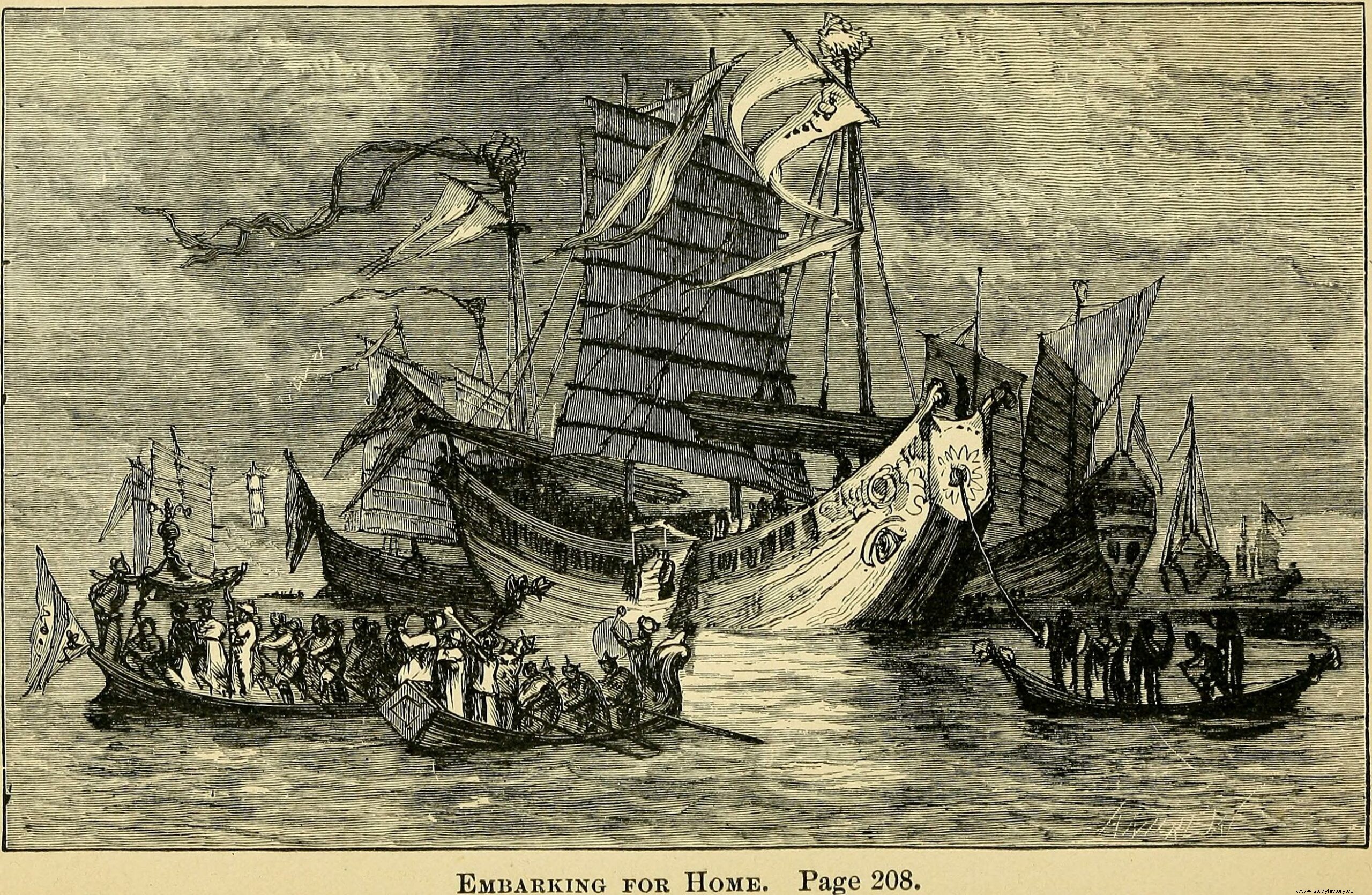
- Credit:Editing
Eventually, peace was made between Venice and Genoa in the summer of 1299. Marco Polo had spent a year in prison working on his book with Rustichello. He returned to Venice and remained there with his wife and three daughters until his death in 1324. 70 years old and on his deathbed, many still wanted to know if he had really seen what he claimed. To this he replied "I did not write half of what I saw, because I knew I would not be believed".
In the will, he left the family a large sum of money. He further stated that his servant, who was from the Mongols, was to be released. Years after his return to Venice it was found that he still owned exotic artifacts from the Mongol Empire. Among silk and brocades was the golden tablet of the Khan.
The significance of Marco Polo in history
-
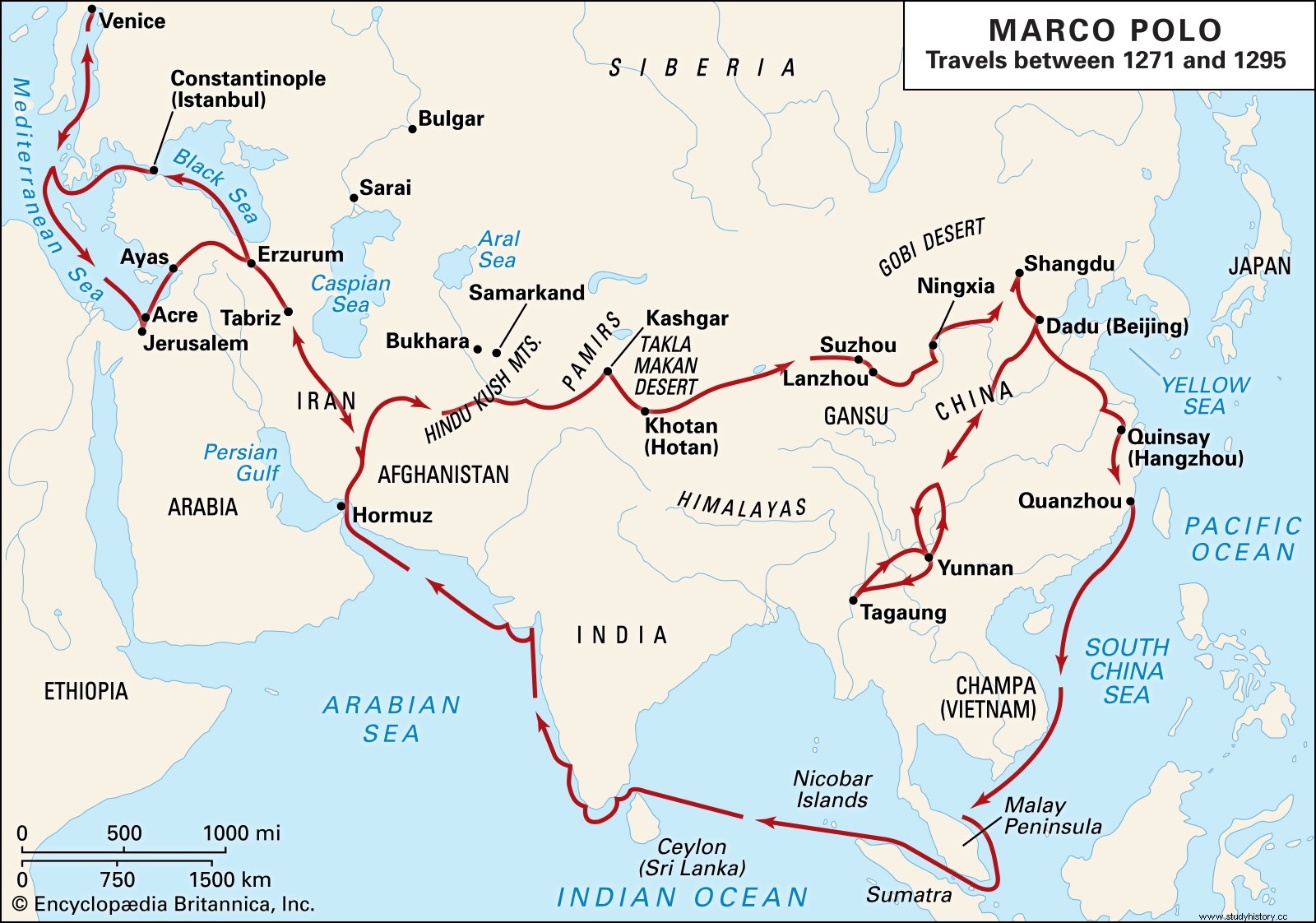
- credit:britannica
Still today, many are skeptical about whether Marco Polo ever got to China. In his works, he never mentioned many aspects of Chinese culture, such as calligraphy or tea. While this may seem strange, it should not discredit his incredible stories. His accounts are confirmed by what we know today, although this may not mean that he witnessed these things firsthand. Stories of dragons and monstrous elephant-killing birds may seem like a fairy tale, but perhaps they are true. True or not, Marco Polo's works and stories have lived on. Christopher Columbus brought with him a copy of The Travels of Marco Polo when he left in 1492.
"I think it was God's will that we should return ... so that men may know the things that are in the world ... as we have said in the first chapter of this book, no other man, Christian or Saracen ... Mongolian or pagan, has explored as much of the world as Messer Marco, son of Messer Niccolo Polo ... a great and noble inhabitant of the city of Venice. ”
